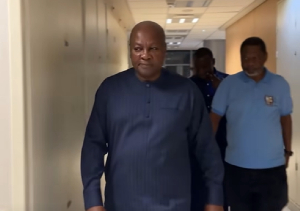...to coach senior national team
There is every indication that the Ghana Football Association will have a host of coaches from which to make a ‘best choice’ to select who would carry the nation to the World Cup in 2006.
By last Friday the list of applicants for the job was known to be six but two well known faces in Ghana soccer Burkhard Ziese and Giuseppe Dossena have swelled the number to eight, according to sports bi-weekly Graphic Sports. Ziese in a phone call to the paper intoned that his application has been lying on the GFA’s table since last October.
If appointed it would be a popular decision amongst the fans for Ziese as the man, with affinity for physically strong sides, has already had a successful two-year stint managing the Stars from 1989 and, in fact, managing to qualify the country to its first nations cup in 1992 after 10 years in wilderness. But before the ’92 tournament Burkhard had been shown the exit for differences between him and the powers that be.
Also revealed to have applied is Guiseppe Dossena. The Italian's two-year contract was not renewed in 2000 much to the dismay of some admirers who believed he had made considerable progress with the team. As such few would begrudge him a second chance to establish once and for all his capability of leading the Black Stars to their first World Cup.
However, if fresh blood is the answer to the dismal showing of the national side in recent years, then the GFA is certainly not short of choices as the remaining six candidates have had no previous business with the Black Stars side. One name to feature on this list is Ian Porterfield, an Englishman born on 11 February 1946. Although he has had no dealings with the Black Stars his experience on the African scene speaks for itself.
He took the reins of Zambia FC between 1993 and 1994 before briefly moving back to Britain as a consultant to Premier League side, Bolton Wanderers, in 1995. He then returned as head coach of Zimbabwe for a year between 1996 and 1997. Also serving to increase his knowledge of the international game was his time with Oman in the Emirates. However, his most impressive achievement to date came while he was in charge of Trinidad and Tobago between 1999 and 2001, during which time he steered the side to an impressive COPA Caribbean success.
Argentine Carlos Percini has also stepped forward as a potential successor to the throne left vacant by stand-in coach Osam Duodo. Previously his field of expertise had been confined to his homeland where he assisted the Argentine national team coach. Working with such a prestigious side could well stand him in good stead if he is entrusted with the job.
Also to throw his name into the hat is Alan Jeffers from the school of Soccer Excellence in the USA. Unlike Percini, he is familiar with West African football and even held a course for coaches here in Ghana, which could give him an edge when the appointment is made. Impressively, Jeffers also possesses 'A' licences with the USA federation, the English FA and UEFA. Outside the sport his other accolades include graduating with B.E.D Honours from London University and an M.E.D at Manchester University, the equivalent of an American PHD.
The sixth name on the list is a Croation, Marljan Vlak. Born in October 1955, he managed much acclaimed club side FC Dynamo, and since then he has maintained a position as Top Expert Board member of the triumphant Croation national team, which has qualified for the upcoming World Cup in Japan and Korea. If Vlak is selected he will be the first Croat to lead a Black Stars side, whilst if Ziadinovic Millan is chosen he will be the first Yugoslav.
The veteran coach managed the under-21 Olympic team between 1995 and 1998 before taking charge of the national side between 1998 and 1999. Outside Yugoslavia, he was also appointed Head coach of Saudi Arabia in 1999. Millan also speaks English and German, ensuring there will be few problems with communication if he is eventually handed the position.
Completing the octet is Polish-born Antoni Tiechniczek who managed the Polish side between 1980 and 1986. Of uppermost significance is the fact that he is familiar with African football, having had two spells as coach of Tunisian club side Esperance; and he too has fine linguistic skills, speaking English and French.
The GFA has cited May as the deadline to find a suitable candidate for the position, and it is widely held amongst the football fraternity that many more potential coaches will put their names forward before that time. As such the Black Stars appear to be in an enviable position, with a host of proven coaches bidding to arrest the dreary performances that have plagued the national side in recent years.












